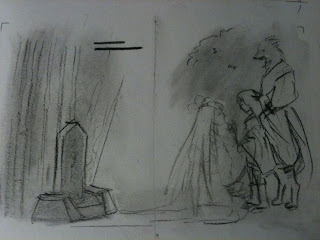Warning before you scroll or read the links: while the class is to create picture books in the style of children's picture books, this is very much so not something I'd tell a small child. I would especially not tell a small child this story if they have a step-parent. It's like Cinderella, except there is no prince or happy ending.
Anyhow, first steps are character designs and storyboards. I'll load up the character designs and thumbnails later, but I took some pictures of my favorite layouts of the storyboards to share:

Father forgets Mother-Who-Died. O'Yoné doesn't.
 Stepmother is jealous of O'Yoné's relationship with Father.
Stepmother is jealous of O'Yoné's relationship with Father.
Father receives news from the Capital.
 Stepmother is jealous of O'Yoné's relationship with Father.
Stepmother is jealous of O'Yoné's relationship with Father.Father receives news from the Capital.
 Father plays the flute.
Father plays the flute. Father leaves the Capital.
Father leaves the Capital. "[She is] In the bamboo grove."
"[She is] In the bamboo grove." Father plays the flute a final time and finds O'Yoné's body.
Father plays the flute a final time and finds O'Yoné's body. Father kills Stepmother and becomes a monk to repent.
Father kills Stepmother and becomes a monk to repent.Yeah, like I said: not a kid's tale. It is a great, if tragic, story, and I thought that it was simple enough while also lending a lot to potential scenery, which is why I picked it. I never do anthro characters, too, aside from where it's needed (i.e. werewolves, Beauty and the Beast, Journey to the West and similar stories), but I thought it would be interesting to turn the characters into anthropomorphic creatures from Japanese mythology, so I made Father into a general kitsune, Mother-Who-is-Dead into a tengu woman (her hair and O'Yone's are both wings), Stepmother into a ninetails kitsune and O'Yoné into a mix of tengu and kitsune. I got a lot of inspiration in the character design from Okami, too, particularly in how to do the tengu hair.




No comments:
Post a Comment